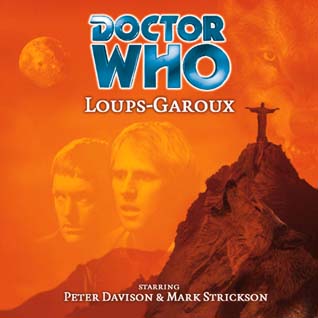
Released May 2001
In ‘Loups-Garoux,’ Marc Platt successfully brings werewolves, creatures surprisingly not truly explored up to this point, into the world of Doctor Who, weaving a very emotional and gripping tale in the process.
Platt bravely chooses to portray the werewolves as actual people with a dark and primal urge lurking beneath the surface rather than as baseless monsters and in so doing allows a greater degree of individuality and attachment to develop. Lichtfuss and Jorge consider themselves superior to humanity but realize the importance of staying hidden out of sight to survive whereas Inez and Ilaena desire a cohabitation with humanity, Ilaena concerned only about her son. On the far extreme end of the spectrum, though, is the villain of the piece, the ‘Lobo King’ Pietr Stubbe, who looks to rule the wolves and humans alike. The Doctor is all too aware of the threat Stubbe poses, calling him one of the most dangerous beings ever produced, and Stubbe exudes this power through a combination of brutality, charisma, and cruelty. At the same time, though, the wolves are linked to the Earth, Stubbe more than most, and the rather opaque ending in the TARDIS where he surrenders himself to his jungle spirits while decrying the humans’ destructive tendencies is very fitting and telling of the deeper connection his race holds.
In some respects, ‘Loups-Garoux’ works as a romance, another subject not often touched on in Doctor Who. As the Doctor enters the scene and defends the werewolf culture as one worth protecting while condemning those who want to kill and live in tyranny, he slowly earns the affectations of Ilaena. This puts the Doctor in more direct conflict with Stubbe, who has eyes on regaining Ilaena’s love for himself. The emotion is actually played to very good effect and the relationship that develops is quite touching, making the ending as the Doctor must decide whether to remain on Earth forever to be with her or to continue with his travels all the more impactful.
Peter Davison gives one of his best performances as the Fifth Doctor here, going to both gentler and sterner extremes than he usually does, determinedly protecting the werewolves’ rights and believably falling for Ilaena as she falls for him. At the same time, he bravely and adamantly challenges Stubbe and valiantly speaks against attempts to ‘cure’ lycanthropy, all perfectly in line with his character. Mark Strickson’s Turlough is also given some very good work here, exploring his characters’ troubled side more than the previous ‘Phantasmagoria’ allowed. In fact, it is through the events of this story as Turlough learns to control his darker urges and impulses that a clearer connection to his eventual departure in ‘Planet of Fire’ can be made.
Platt has crafted a well-written tale, one that retains an air of mysticism respecting the werewolf folklore while contrasting with a subtly more technological human future. The danger and power of the lycanthropic nature is never far from the surface, and the conflicting viewpoints both within the werewolf population and from the humans involved is fascinating to behold. Nicky Henson and Eleanor Bron are superb as Stubbe as Ilaena, respectively, effectively conveying their individual plight, and Burt Kwouk is equally fantastic as the misguided Hayashi who wants nothing more than to cure the werewolf plague, even if the werewolves’ themselves do not want curing. It is these strong supporting performances along with excellent direction and sound design that greatly captures the feel of 2080 Carnavale that separate ‘Loups-Garoux’ and make for a very enjoyable tale and a welcome addition of the werewolf culture to Doctor Who at long last.
- Release Date: 5/2001


Leave a Reply